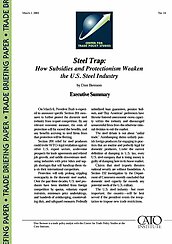Protection will only prolong crippling overcapacity in the domestic steel market. Over the past three decades, U.S. steel producers have been shielded from foreign competition by quotas, voluntary export restraints, minimum price undertakings, and hundreds of antidumping, countervailing duty, and safeguard measures. Federally subsidized loan guarantees, pension bailouts, and “Buy American” preferences have likewise fostered uneconomic excess capacity within the industry and discouraged unsuccessful firms from the otherwise rational decision to exit the market.
The steel debate is not about “unfair trade.” Antidumping duties unfairly punish foreign producers for engaging in practices that are routine and perfectly legal for domestic producers. Under the current definition of dumping in U.S. law, every U.S. steel company that is losing money is guilty of dumping here in its home market.
Claims that steel imports threaten national security are without foundation. A Section 232 investigation by the Department of Commerce recently concluded that domestic steel capacity far exceeds any potential needs of the U.S. military.
The U.S. steel industry–but more important, the country–will be best served if the president resists the temptation to impose new trade restrictions.


